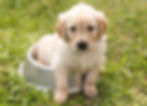First impressions matter: bringing your new puppy home
- Harriet Alexander
- Oct 21, 2018
- 4 min read
Bringing a new puppy home is pretty high on the 'exhilarating life moments' list. But while you're giddy and elated about this furry bundle of cuteness, it can be easy to forget that it's a scary moment for a puppy. They've been abruptly snatched away from their mother, littermates and the only environment they've ever known. So before you get cracking on those training aims or create a 'Welcome Roger the pomeranian!' Facebook event, remember that what your puppy needs most during this time is safety, security and healthy bonding time with you.
So how can you make this vital first moment successful?
The journey home
Bring loads of blankets and towels for the car (or bus, train etc.) journey. It's common for puppies to get carsick. Your puppy is likely to be feeling a little freaked out, so having them on your lap for the journey can be reassuring for them. A safe option is to buy a puppy car harness in advance which clips into the seatbelt buckle. A soft bag or crate with lots of bedding can also be a good option (especially on public transport) as they'll be less disturbed by noise, crowds and lights. If the breeder can spare some bedding or toys from their home, it’s great to take these with you and put them in your puppy’s new bed as the familiar smells will be comforting. Some people swear by Adaptil collars and diffusers (which can be easily found online or in many vet practices).

Resist the puppy party
Keep things low key when you bring your puppy home. Puppies need lots of sleep and are likely to be tired. Around 18 hours of sleep is normal for a puppy. It can be tempting to invite friends and family over to meet your new furry family member, however it's wise to wait a few days so they have a chance to settle in. Humans tend to lose their heads a bit around puppies, and everyone will want to play with, pick up and get your puppy's attention. If you do have visitors, keep things as relaxed as possible, and give your puppy plenty of breaks from the social activity.

First meals
Some puppies come through the door and start chowing down on the first thing put in front of them. Others may not have an appetite at all and this can last a few days. They may also have an upset stomach. This is all quite normal and simply a result of the stress they experience when they leave their first home. Make sure they have access to water at all times to avoid dehydration, and if the problem continues seek advice from your vet. You are likely to be given food by the breeder that the puppy is used to. This doesn’t mean they have to be on this food for life (despite what you may be told). It’s important to do your research and go with what you are most comfortable with long term. That being said, introduce any changes gradually, especially in the early days.

Immunise against vet anxiety
Set up an introduction with your vet early on. For most puppies the first vet visit involves a load of painful vaccinations and some poking and prodding. Not an ideal first impression. Ask your vet if you can initially just stop in and say hello so the puppy can have some treats, a bit of a fuss and then leave again. If the vet is nearby you may even be able to drop into reception intermittently, offer those tasty treats, then wander out. This helps to build a positive association from the start as the puppy learns that the vet doesn't always equal pain or discomfort.

Getting the right ZZZz
Work out sleeping arrangements in advance and make sure everyone in your household agrees. Your puppy is likely to cry during the night if they are alone, but they can be taught to progressively move from your bedroom to another area in gradual stages. There's also absolutely nothing wrong with wanting your dog as a permanent foot warmer if that's your preference. The most important thing early on is that they feel safe and don't experience high anxiety during this crucial time of brain development. If they are left to 'cry it out' they can become extremely distressed, and if they are crying because they need to go to the bathroom and they're being ignored, this can slow the housetraining process.
Crates are incredibly popular these days and a real go-to solution in dog training. I don't like, use or recommend them, especially if they isolate the puppy and force them to hold their bladder for longer than is physically healthy (you can read further thoughts on the crate debate here). If you do want to restrict their access to things in the room, a large puppy pen with a comfortable bed, things to chew, water and some puppy pads or newspaper is a less restrictive setup. Baby gates also work wonders to manage areas while your puppy learns how to navigate their new home. The big advantage of having your puppy in your room is that they are likely to sleep more soundly (which means you will too) and you'll be able to hear when your puppy is restless so you can take them out to go to the bathroom.

Getting a new puppy can be a wonderful (if at times exasperating) experience, and a bit of thought and planning goes a long way.
